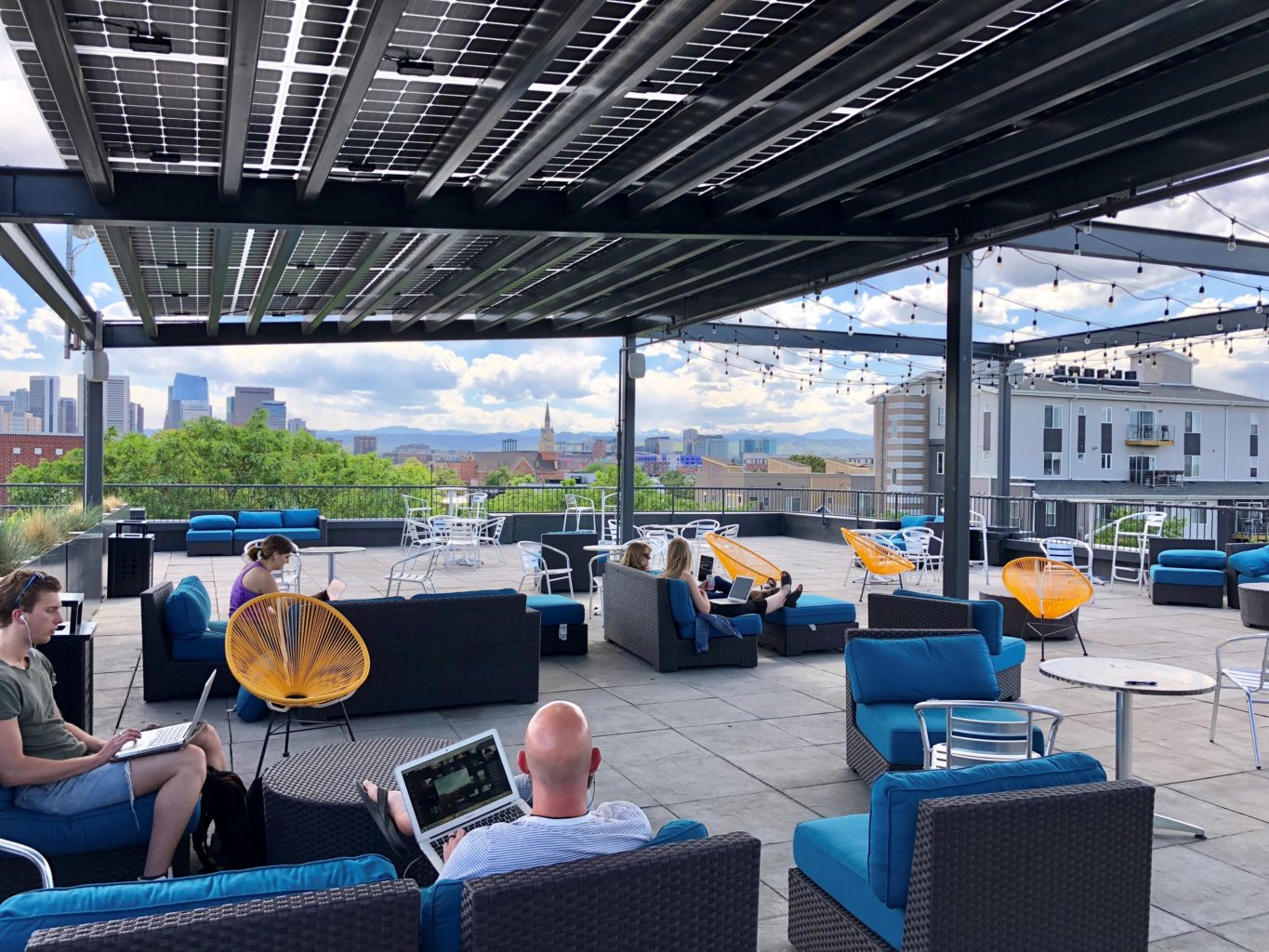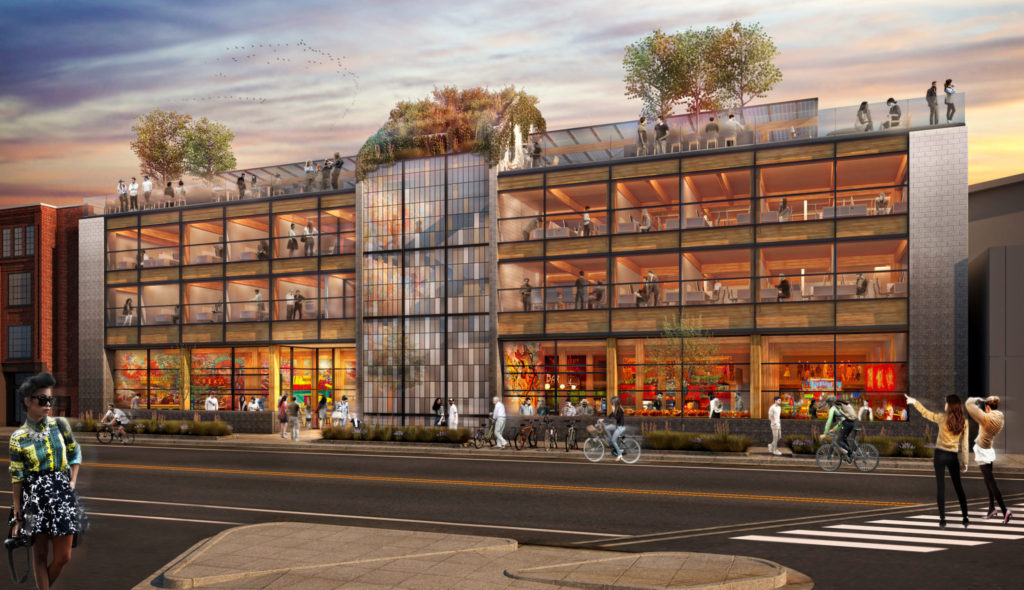Josh Fine is the COO of Focus Property Group, a real estate operator that not only builds and owns their buildings but operate the businesses that are contained within the building as well, including coworking. We have interviewed Josh Fine to learn more about his experience and knowledge on real estate and his way to understand the coworking and hospitality sector. An interview full of insights and vision on #futureofwork!
Hi Josh. Can you introduce the Focus Property Group?

Josh Fine
Focus Property Group has been investing in commercial real estate, primarily in downtown Denver, Colorado (USA), for the past three decades. We acquire, assemble and entitle development parcels, and we develop a wide variety of commercial real estate asset types, including office and coworking, retail centers, hotels, senior housing communities, industrial buildings, and self-storage facilities.
We are long term holders of real estate, meaning that once we develop and lease out our real estate, we continue to manage and own the assets. One unique aspect of our business model is our willingness to create, own and manage operating businesses within our real estate.
In other words, most real estate companies will build and own the buildings but not operate the businesses that are contained within the building. However, we enjoy the entrepreneurial aspect of operating companies. Therefore, rather than build, for example, a self storage facility and then hire a self storage management company to run the business, we created our own self storage brand, hire our own employees and run that business ourselves. It is the same with coworking. We created the Enterprise Coworking brand and all of the Enterprise Coworking employees are on our payroll.
You have been involved pretty early in the coworking wave while investing in hotel industry as well. To what extend are the lines between those “hospitality” driven activities blurring?

Enterprise Coworking, Denver
I am constantly telling our coworking staff that we are in the hospitality business. It has become a mantra of our company. Office space is not new. The innovation of coworking is that it introduces a hospitality or guest services aspect to office space. Our members don’t just want a convenient space to work. They want experiences that will enrich their lives and careers. They want concierge services to help them with all of the challenges that arise during the day so they can focus on what it is they came into the office to do. When a member approaches one of our community managers with an issue, I tell our team to imagine you are at the front desk of the Four Seasons Hotel. Hotel guests are often in disorienting, foreign environments and the hotels that truly shine are the ones where the team makes the guests feel welcome, at ease, and excited to dive in to all of the great things that brought the guest to that city in the first place. It is the same with coworking.
The hotels that truly shine are the ones where the team makes the guests feel welcome, at ease, and excited to dive in to all of the great things that brought the guest to that city in the first place. It is the same with coworking
 The spaces that will separate themselves from the competition will have a guest services oriented staff that makes members feel welcome, well cared for, and excited to dive into the projects that brought them into their workspace. Because the service offering is so similar, it is true that lines are blurring between hospitality and coworking. For one, the skill sets overlap so much that many of our best hires come from hospitality. And you see hotels are increasingly getting into the coworking space. Pioneering hotels like the Ace Hotel in New York City, the Hotel Eaton in Washington DC, the Zoku Hotel in Amsterdam, and many others have full fledged coworking spaces and welcome the coworking public to consider the hotel as their living room or office, with free wifi, free-flowing (if not free) coffee and beer and other coworking-like amenities. Business is becoming increasingly nomadic and I predict that we will see more and more joint hotels & coworking spaces that co-locate, share amenities and staff, and synergistically energize each other’s vibes.
The spaces that will separate themselves from the competition will have a guest services oriented staff that makes members feel welcome, well cared for, and excited to dive into the projects that brought them into their workspace. Because the service offering is so similar, it is true that lines are blurring between hospitality and coworking. For one, the skill sets overlap so much that many of our best hires come from hospitality. And you see hotels are increasingly getting into the coworking space. Pioneering hotels like the Ace Hotel in New York City, the Hotel Eaton in Washington DC, the Zoku Hotel in Amsterdam, and many others have full fledged coworking spaces and welcome the coworking public to consider the hotel as their living room or office, with free wifi, free-flowing (if not free) coffee and beer and other coworking-like amenities. Business is becoming increasingly nomadic and I predict that we will see more and more joint hotels & coworking spaces that co-locate, share amenities and staff, and synergistically energize each other’s vibes.
The spaces that will separate themselves from the competition will have a guest services oriented staff that makes members feel welcome, well cared for, and excited to dive into the projects that brought them into their workspace
Why does it make sense for a buildings owner company to operate coworking space itself ? Why not partner up with third parties operators?
It certainly doesn’t make sense for every building owner. Coworking is a complex operating business and many landlords simply don’t have the bandwidth or aptitude to run such an intensive operating business. However, the explosive growth of coworking has resulted in a spillover effect where traditional office tenants have come to expect more coworking-like amenities in their office buildings, and office building owners will need to more and more inch toward the type of offering that users can find in coworking spaces. Since office building owners will need to increase service offerings anyway to stay competitive, those who can figure out how to jump into the coworking business will be at an advantage and will also be able to benefit from two profit centers: the rent that the coworking operator pays to the landlord and the operating profit that the coworking operator earns from the members.
Those who can figure out how to jump into the coworking business will be at an advantage and will also be able to benefit from two profit centers: the rent that the coworking operator pays to the landlord and the operating profit that the coworking operator earns from the members.

Enterprise Coworking, Denver
A building owner who reserves part of their building for coworking will likely also benefit from higher overall occupancy. Companies in the building who “graduate” from coworking and want their own space may be able to rent another office space in the same building. And when tenants leave the building, the landlord always has the possibility of expanding the coworking space into the former tenant’s space and thereby gobble up any vacancy immediately. Once a landlord has a successful track record as a coworking operator, it makes it easier for a landlord to acquire or develop additional buildings, because the landlord will have a tenant in their “back pocket” (the coworking space) that can immediately occupy part of a new building.
From the operator’s side, the reason to own rather then rent space is very compelling. In traditional office leasing, there is generally an equilibrium of power between landlord and tenant. Office leases tend to be for shorter periods than retail leases. When it comes time for renewal, the landlord will need to be reasonable and will have to closely reflect market conditions because the tenant can move to a new office building if the landlord tries to increase rent too dramatically. It is certainly a hassle for a company to move, but a CEO can decide to do it and all of the employees will have to follow suit.
But coworking spaces are more like retail users – they are much more tied to their buildings. Just as it is difficult and much more risky for a retailer to move (because there is no guarantee that its customers will all move with it to the new location) so too it is extremely risky for a coworking space to move. The coworking operator can sign a new lease in a new building, but there is no guarantee that the members will follow suit. If the members do not follow, the operator will be starting to build the business all over again. Therefore while building ownership certainly comes with significant risks of its own, it mitigates a major risk of the coworking model.
Coworking spaces are more like retail users – they are much more tied to their buildings. Just as it is difficult and much more risky for a retailer to move, so too it is extremely risky for a coworking space to move.
Do you see a difference in the way coworking spaces are operated between the stand-alone supported-by-a-property-owner-company and franchised/brand coworking spaces?
 We compete head-on with franchised coworking spaces and large brands and I do not believe that members in our space are looking for anything dramatically different. Most members are looking for a vibe that meshes well with their personality and work style, for a convenient location, for robust amenities and for a welcoming and engaging community. One difference I have noticed is that when you own your building there is no passing the buck. Any issue with the building becomes your issue. You cannot blame the building management, for example, if the temperature is too cold or if an elevator is out-of-service.
We compete head-on with franchised coworking spaces and large brands and I do not believe that members in our space are looking for anything dramatically different. Most members are looking for a vibe that meshes well with their personality and work style, for a convenient location, for robust amenities and for a welcoming and engaging community. One difference I have noticed is that when you own your building there is no passing the buck. Any issue with the building becomes your issue. You cannot blame the building management, for example, if the temperature is too cold or if an elevator is out-of-service.
However, an advantage we have is that when you own the building, anything is possible in terms of dealing with a member issue. Sometimes a member complains about something that the coworking operator cannot control because it is the purview of the building owner and manager. For example, many office buildings have communal restrooms that are maintained by the building management. They may have a snack bar or coffee shop in the lobby. They may have a parking facility used by the tenants. If a member has an issue with any of these things, all the coworking operator can do is complain to their landlord to fix the problem. When you own the building, the buck stops with you. This is both a blessing and a curse. We have the power to fix any problem and can control more completely how our members experience our space. On the other hand, when there is a difficult issue we cannot look to others to address it.
If a member has an issue with any of these things, all the coworking operator can do is complain to their landlord to fix the problem. When you own the building, the buck stops with you. This is both a blessing and a curse.
In the short future, coworking growth is expected to be fueled by Small and Medium size businesses, not only by freelancers and startups. Do you see this evolution coming in Denver?
Absolutely. The bulk of our membership is small companies with teams of 4-12 people. Freelancers are increasingly becoming a smaller and smaller minority of our membership base. There has been talk for the last several years of enterprise-level companies (with much larger teams of 50+ people) abandoning traditional office leases and moving into coworking. I don’t think we are there quite yet, although there have been some notable examples of large companies moving into coworking spaces in Denver. At our space, we do have some large companies, with our largest company topping out at about 80 employees. However, we have also seen companies move out of our space when they get to 20 or 25 people.
The bulk of our membership is small companies with teams of 4-12 people.
 I think it very much depends on the personality of the company. Some companies will always want their own space and will move out of coworking once they reach a certain size. So I think there will always be a market for traditional office space and the obituaries of traditional office space are a bit premature. However, a few companies have grown to love coworking and will stay in a coworking space for as long as they can be accommodated. Spaces like ours that can accommodate large teams will be able to find companies that want to move in. Nonetheless, I think the bulk of the demand comes from small companies, and we are building out new spaces with a heavy emphasis on private suites for teams of 4-12 people.
I think it very much depends on the personality of the company. Some companies will always want their own space and will move out of coworking once they reach a certain size. So I think there will always be a market for traditional office space and the obituaries of traditional office space are a bit premature. However, a few companies have grown to love coworking and will stay in a coworking space for as long as they can be accommodated. Spaces like ours that can accommodate large teams will be able to find companies that want to move in. Nonetheless, I think the bulk of the demand comes from small companies, and we are building out new spaces with a heavy emphasis on private suites for teams of 4-12 people.
Companies have grown to love coworking and will stay in a coworking space for as long as they can be accommodated.
In-house Gym, cafés,… We see a race to provide the most exciting, robust and unique amenities in order to distinguish from the competition. How far will it go?

Our flagship location in the RiNo neighborhood of Denver has both an in-house café and espresso bar as well as a fitness center. The types of amenities you need can depend largely on your location. If you have a trendy espresso bar next door, you may not need to offer one in your coworking space. I think the best way to choose which amenities to offer is to make sure there is a diversity of “types” of spaces.
There should be a quiet space for heads-down work where you won’t be disturbed. There should be a buzzing, social space. There should be a networking space that is conducive to impromptu meetings and making connections. In our flagship space, these needs are filled, respectively, by our library, our pub and game room (that we call the “rathskeller”), and our espresso shop. However, other coworking spaces can fulfill these needs with amenities that may be less space- and operationally-intensive.
Shall all those amenities be provided by the same operators?
I mentioned earlier how coworking spaces and hotels are beginning to “blur” their boundaries and I think that coworking operators to remain competitive will need to learn to operate the same type of amenities as hotels. Just as a hotel doesn’t just need to know how to rent out hotel rooms, but also how to operate a restaurant, coffee shop, gym, pool, event space or conference center, so too will coworking operators needs to establish these competencies. I think that co-locating – especially hotels and coworking – could be a great solution to this operational challenge.
There is a huge overlap between the type of amenities that hotel guests and coworking members want. Shrewd coworking operators will partner with hotels – or join forces and completely merge their businesses – and thus have the scale to offer more robust amenities than either could on their own. Regarding the price, I think a hotel analogy is apt here as well. There is a huge diversity in hotels. You can stay at a one- or two-star motel that gives you very little other than a place to sleep, or a five-star resort that provides a slew of services, like multiple dining venues and bars, a spa and pool, and dramatic public spaces. Of course a guest will expect to pay a lot more for the latter. There will need to be similar differentiation in coworking spaces. However, an operator who wants to charge top-of-the-market pricing will need to offer five-star amenities to retain members.
Just as a hotel doesn’t just need to know how to rent out hotel rooms, but also how to operate a restaurant, coffee shop, gym, pool, event space or conference center, so too will coworking operators needs to establish these competencies.
Would you say it is US specific or are those trends reaching all continents from what you see?
We live in a global village and I am not even sure the trends I described originated in the United States. I just stayed at a hotel in Herzliya, Israel, which was connected to a vibrant coworking space. In the basement was a huge fitness center (much bigger and more elaborate than you would typically find in a small hotel) complete with a dry sauna and steam room. I went down to the fitness center in the morning and it was packed in equal parts by hotel guests and coworking members (as well as people in the community who simply bought a gym membership). This is the type of co-locating and amenity sharing concept that I think will become more commonplace as all of these businesses try to supersize their amenities in an increasingly competitive market.
Join us at Coworking Europe Conference for more insights, data and connections!




0 Comments